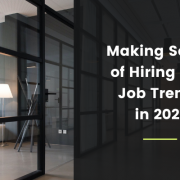Is Jumping from the Unconventional Career Track a Good Thing?
Confidence Education Being unconventional works (not always, but way more often than you think).
Being unconventional works (not always, but way more often than you think).
I’ve been travelling recently and yes, I usually end up asking strangers what they do for a living. A few of these recent conversations have included me asking “What’s the most surprising thing about your field or job?” What can I say? I’m a career geek. Their answers help me connect dots between careers and interests.
I got to thinking – what if someone asked me that question? How would I answer it? I had to really ponder this. One of my pet peeves is how the job search process is broken, and while it annoys me, frustrates me and, let’s be honest, pisses me off — I don’t think it’s my biggest surprise.
I mean, from the time I was 12 years old and wrote my first cover letter for a coveted assistant job at the local library, I’ve known that the job search process was skewed (I got the job, but it taught me more about writing a cover letter and resume than it did about getting a job).
So my biggest surprise… drumroll please, is the number of successful people who have unconventional educational qualifications. Now, I could have said “no college degree” as that pretty much sums up what they have in common. (I’m confident some of you are thinking you were the only one in this unique situation. Am I right?) Well hold on, because I’m about to rock your world. But before I do that — here are the common themes I hear from professionals who don’t have a college degree:
- “I’m only a few credits short of a college degree.” Usually some sort of logistical issue at play rather than the classic misconception that people “quit” when they get close to finishing.
- “I dropped out because I just weren’t interested in school, or I started to make money with some sort of job/business and decided to pursue that instead.” Usually intended to go back at some time, but there hasn’t been a good time.
- “I just didn’t want to go to college.” What’s interesting here is that most have never admitted this as the real reason. Seems like admitting you’re not interested in going to college is an admission of failure, of sorts. So they told their parents that they were taking a year off (that stretched into 7 or 10 years) or that they needed to figure out what they wanted to study first.
But at some point in time, many of them see their lack of a college degree as a hindrance to them achieving certain professional goals. They are embarrassed to talk about it. They try and cover it up on their resume and/or application. They are apologetic. They have an unconventional educational background and they feel bad about it. They’ve been successful despite this unconventional track, yet they feel strangled by it too.
Newsflash: You aren’t the only one! You aren’t alone. Stop acting like it’s a liability and instead, figure out how to capitalize on it and how it makes you unique. Now, if you’re pursing jobs at an organization that requires you to have a college degree, or you’ve been told that you have to get a college degree in order to be promoted, you have a huge decision to make. Your decision is whether or not you want to buy into this requirement, or if you want to jump ship and work elsewhere. You still have a choice. Don’t forget that.
And finally, here’s the “rock your world” part: Unconventional backgrounds are going mainstream. That’s right. Think homeschooling, college dropout standouts like Steve Jobs and expertise specialization, where depth of experience is king. This is a trend we can’t ignore.
I’m not saying that a college education isn’t valuable — I’m just saying that trying to jump from the unconventional track onto the conventional track isn’t always the right choice. Instead of being ashamed that you didn’t complete your college degree, be honest about it. Don’t waste time trying to jump tracks.



